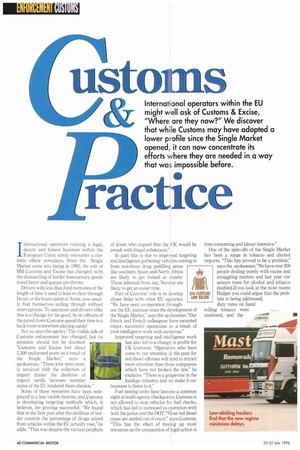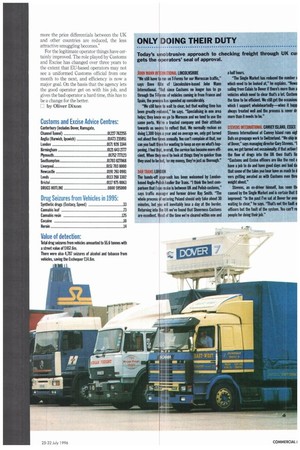ustoms ractice
Page 44

Page 45

If you've noticed an error in this article please click here to report it so we can fix it.
Inter national operators running a legal, decent and honest business within the European Union rarely encounter a customs officer nowadays. Since the Single Market came into being in 1993, the role of HM Customs and Excise has changed: with the dismantling of border bureaucracy, goods travel faster and queues are shorter.
Drivers with less than fond memories of the length of time it used to take to clear through Dover, or the hours spent at _Aosta, now usually find themselves sailing through without interruptions. To operators and drivers alike this is a change for the good. So do officers of the pared-down Customs spend their time in a back nxnn somewhere playing cards?
Not so, says the agency. The visible side of Customs enforcement has changed, but its presence should not be doubted: "Customs and Excise lost about 1,300 uniformed posts as a result of the Single Market," says a spokesman. "These jobs were mostly involved with the collection of import duties: the abolition of import tariffs between member states of the EU rendered them obsolete."
Some of these resources have been redeployed in a less visible manner, and Customs is developing targeting methods which, it believes, are proving successful; "We found that in the first year after the abolition of border controls the percentage of drugs seized from vehicles within the EU actually rose," he adds. "This was despite the various prophets of doom who argued that the UK would be awash with illegal substances."
In part this is due to improved targeting and intelligence gathering: vehicles coming in from notorious drug peddling areas like southern Spain and North Africa are likely to get looked at closely. Those inbound from, say. Norway are likely to get an easier time.
Part of Customs' role is to develop closer links with other EU agencies: "We have seen co-operation throughout the EU increase since the development of the Single Market," says the spokesman."Our Dutch and French colleagues have mounted major, successful operations as a result of joint intelligence work with ourselves."
Improved targeting and intelligence work has also led to a change in profile for UK Customs: "Operators who have come to our attention in the past for red diesel offenses will tend to attract more attention than those companies which have not broken the law," he explains. 'There is a grapevine in the haulage industry, and we make it our business to listen to it."
Fuel testing units have become a common sight at multi-agency checkpoints. Customs is not allowed to stop vehicles for fuel checks, which has led to increased co-operation with both the police and the DOT: "Most red diesel cases are settled out of court," says Customs. "This has the effect of freeing up more resources as the preparation of legal action is
AND
time consuming and labour intensive?'
One of the spin-offs of the Single Market has been a surge in tobacco and alcohol imports. "This has proved to be a problem," says the spokesman."We have over 300 people dealing purely with excise and smuggling matters and last year our seizure rates for alcohol and tobacco doubledli. you look at the most recent Budget you could argue that the problem is being addressed; duty rates on hand rolling tobacco were
unaltered, and the —woo
more the price differentials between the UK and other countries are reduced, the les attractive smuggling becomes."
For the legitimate operator things have certainly improved. The role played by Customs and Excise has changed over three years to the extent that EU-based operators may not see a uniformed Customs official from one month to the next, and efficiency is now a major goal. On the basis that the agency lets the good operator get on with his job, and gives the bad operator a hard time, this has to be a change for the better.
C by Oliver Dixon












































































































